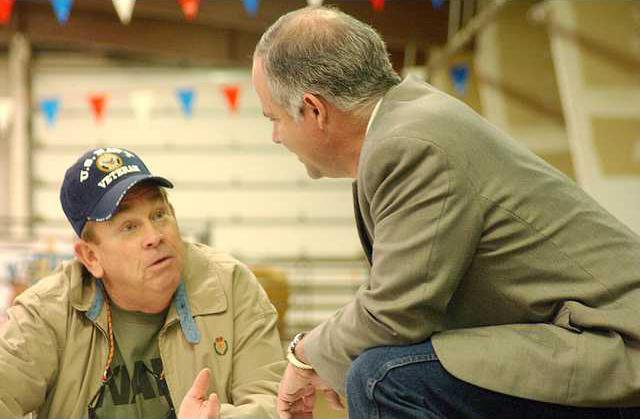Tim Huelskamp has served in Congress as the freshman First District Republican congressman for a little over a year now. He’s learned one thing – he’s not in Kansas anymore.
“Those in Washington, D.C., are so out of touch with what you experience here in Great Bend,” the Fowler native said during a town-hall-style meeting Wednesday afternoon. “The atmosphere in Washington is so negative.”
Huelskamp was in town Wednesday for the opening of the first-ever Great Bend Farm and Ranch Expo. He stuck around after the ribbon cutting at the Expo Complex to visit with constituents about topics ranging from the limbo-bound new Farm Bill to the ballooning federal budget deficit to veterans’ affairs.
“If you look across the economy, there are two sectors that are doing well,” he said. These are agriculture and energy.
With the farm show as a backdrop, he said it is good to see ag holding its own since it is so vital to Kansas. But, “this is a year of uncertainty.”
The Food, Conservation, and Energy Act of 2008, aka the “2008 Farm Bill,” is the most recent omnibus Farm Bill. It was enacted June 18, 2008, and succeeded the 2002 farm bill, and expires this year.
Direct payments given to farmers in the event of a crop loss may be on their way out, but Huelskamp said he supports a strong crop insurance provision.
Sadly, he said, the Farm Bill has become a political football. Only about 15 percent of the bill deals with farming, the rest with Food Stamp and nutrition programs.
With only 12 farmers in Congress, there is very little understanding about production agriculture, he said. There is very little willingness to cut the non-farm parts of the bill.
“I think the odds are about 50/50 we will get a Farm Bill passed this year,” he said. The legislation is reviewed or renewed roughly every five years.
One of only four Farm Bill hearings nationwide will take place Friday, April 20, in Dodge City.
But, he said, it is his service on the House Budget Committee that troubles him the most. “Our nation, our federal government is nearly bankrupt. This worries me.”
With the deficit running at about $15.6 trillion, it is about equal to the total size of the U.S. economy. When the two meet, the economy will likely collapse, he said. As it is, we are paying interest to our debt holders, the biggest of which is China.
Medicare, Medicaid and Social Security will have to be in the mix when it comes to solving the budget problem. Huelskamp doesn’t believe increased taxes are the answer. Instead, he wants to see serious cuts in federal spending.
“We need to throw out the entire tax code,” he said. As it is, taxes in the United States are among the highest in the world and this would level the playing field.
Both the House and the Senate need to get together and pass a budget. Despite a 1974 law requiring Congress to pass a budget each year, only the House has done so in the past few years, he said.
As for veterans, he said he serves on the Veterans’ Affairs Committee. Care for vets costs about $57 billion annually and that number is growing with the nation at war and older veterans needed increased services.
There needs to be better access in rural areas, he said. Perhaps, community hospitals could handle Veterans Administration services.
Since taking office, Huelskamp has conducted 100-plus such meetings. “I’m asked if Washington was everything I thought it would be. I say ‘yes, and much worse.’”
Lawmaker glad to be home





